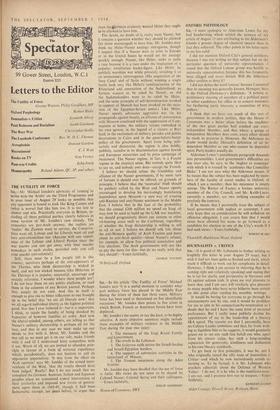OXFORD PSEPHOLOGY
SIR,—I must apologise to Alderman Lower for my bad handwriting which misled the printers of my article of August 15 into attributing to the Alderman's friends a greater degree of electoral success than in fact they achieved. The other points in his letter seem to me less valid.
I did not mention Oxford City's general problems because I was not writing on that subject but on the particular question of university representation. I stated that the Oxford Labour group was hostile to university representation ,because this has frequently been alleged and never denied. Will the Alderman either confirm or deny it?
I did not define the word 'caucus' because I assumed that its meaning was generally known. However, here is the Oxford Dictionary's definition: 'A private or preliminary meeting of members of a political party to select candidates for office or to concert measures for furthering party interests; a committee of wire, pullers.'
I think that we have too much of this sort of government in modern politics, that the House of Commons was a better place before the machine, of the two great parties had crushed out even independent Member, and that where a group of independent Members does exist, every effort should be made to preserve it. However, the Alderman no doubt would prefer Disraeli's definition of an in- dependent Member as one who cannot be depended upon. Party leaders usually do.
Alderman Lower's penultimate paragraph descends into personalities. Local government's difficulties are due inter alio, he says, to the 'neglect or contempt' with which it is treated by 'academics like Councillor Blake.' I am not sure what the Alderman means. If he means that the subject has been neglected by mem- bers of the faculty of social studies in Oxford, of which I am a member, then his statement is simply untrue. The Rector of Exeter, a former university member of the City Council, and Mr. Keith-Lucas, currently a member, are two striking examples of precisely the contrary.
If he means that .1 personally treat the subject of local government with neglect or contempt, I can only hope that on consideration he will withdraw an offensive allegation. I can assure him that I would never have allowed •my name to go forward as a candidate for election in one of the City's wards if I had such views.--Yours'faithfully,
ROBERT BLAKE
Thornhill. Harbleton Mead, Oxford


































 Previous page
Previous page